Hamilton
Other Books by Tony Williams
Washington and Hamilton: The Alliance That Forged America (2015), with Stephen F. Knott
The Jamestown Experiment (2011)
Americas Beginnings: The Dramatic Events That Shaped a Nations Character (2010)
Pox and the Covenant: Franklin, Mather, and the Epidemic That Changed Americas Destiny (2010)
Hurricane of Independence (2008)
Hamilton
An American Biography
Tony Williams
ROWMAN & LITTLEFIELD
Lanham Boulder New York London
Published by Rowman & Littlefield
A wholly owned subsidiary of The Rowman & Littlefield Publishing Group, Inc.
4501 Forbes Boulevard, Suite 200, Lanham, Maryland 20706
www.rowman.com
Unit A, Whitacre Mews, 26-34 Stannary Street, London SE11 4AB
Distributed by NATIONAL BOOK NETWORK
Copyright 2018 by The Rowman & Littlefield Publishing Group, Inc.
All rights reserved . No part of this book may be reproduced in any form or by any electronic or mechanical means, including information storage and retrieval systems, without written permission from the publisher, except by a reviewer who may quote passages in a review.
British Library Cataloguing in Publication Information Available
Library of Congress Cataloging-in-Publication Data
Names: Williams, Tony, 1970 author.
Title: Hamilton : an American biography / Tony Williams.
Description: Lanham : Rowman & Littlefield, 2018. | Includes bibliographical references and index.
Identifiers: LCCN 2017055275 (print) | LCCN 2017056132 (ebook) | ISBN 9781538100189 (Electronic) | ISBN 9781538100172 (cloth : alk. paper) Subjects: LCSH: Hamilton, Alexander, 17571804. | StatesmenUnited StatesBiography. | United StatesPolitics and government17831809.
Classification: LCC E302.6.H2 (ebook) | LCC E302.6.H2 W734 2018 (print) | DDC 973.4092 [B]dc23
LC record available at https://lccn.loc.gov/2017055275
 The paper used in this publication meets the minimum requirements of American National Standard for Information SciencesPermanence of Paper for Printed Library Materials, ANSI/NISO Z39.48-1992.
The paper used in this publication meets the minimum requirements of American National Standard for Information SciencesPermanence of Paper for Printed Library Materials, ANSI/NISO Z39.48-1992.
Printed in the United States of America
To Ray and Nancy Fahrmeier, with gratitude and love
Contents
Acknowledgments
I want to thank Jon Sisk and his team at Rowman & Littlefield for their great enthusiasm for this book and their excellent work publishing it. This is the second book we have done together, and I look forward to many more. Thanks to Jon for a memorable lunch that included great conversation and Maryland crab cakes during a visit.
It has been a great joy to write this book with the constant encouragement of so many family members and friends. David Bobb, Bruce Khula, Steve Knott, and Jeff Morrison have been pillars of friendship in my life and models of scholarship and character. Steve deserves a very special thank you for coauthoring Washington and Hamilton: The Alliance That Forged America , reading the manuscript for this book, and being a good friend. He is the best Hamilton scholar around. I also want to thank all of the following people for excellent conversations, scholarly collaboration, and friendship: Sam Agami, Paul Carrese, Jack and Tanya Cheney, Daniel Dreisbach, Josh Dunn, Hank Edmondson, John Ericson, David Gowdy, Dianna Greenwood, Rebeccah Heinrichs, Kirk Higgins, Mike and Jessica Hosang, Michelle Hubenschmidt, Amanda Hughes, Liz Kaufer-Busch, Sally Khula, Stuart Leibiger, Gordon Lloyd, John and Cheryl Lynch, Michael Maibach, Ken Masugi, Rob McDonald, Bob McKenna, Stacey Moses, Phil Munoz, Mackubin Owens, Julie Ponzi, Joe Postell, David Raney, Amanda Read, Alec Rogers, Kathy Saar, Garrett Ward Sheldon, Julie Silverbrook, Grace Struiksma, Jim Swords, Robert Van Ness, Art Ward, Gennie Westbrook, and all the families of Williamsburg Revolution and Venom baseball. A special thanks to all my colleaguesand all of our teachersat the Bill of Rights Institute who are doing incredibly brilliant and important work advancing civics education across the country. I enjoy presenting several lectures at Colonial Williamsburg annually and really appreciate all the efforts of Trish Balderson to make them happen.
Finally, I want to thank my wife, Lynne, and our children, Catherine and Paul, for all of their support. This book was slightly delayed by attending all of their baseball, basketball, soccer, volleyball, crew, and spring track events, spending time as a family, going to the movies and taking hikes together, reading books at coffeehouses, going on family trips, watching the New York Yankees and Syracuse Orangemen, and generally doing the things that make life worth living.
This book is dedicated to my father-in-law, Raymond Fahrmeier, and my mother-in-law, Nancy Fahrmeier. Nancy tragically passed away on Easter Sunday while I was writing this book. They have been a great source of support through more than twenty-five years, and I am eternally grateful for the gift of their daughter and their love.
Introduction
A lexander Hamilton was an immigrant from the West Indies who became a quintessential American. From his arrival on the shores of his adopted country, he imbued American principles of liberty and self-government that shaped the American Revolution and laid the foundation of the country for more than two hundred years. Shedding his Caribbean heritage, he quickly identified himself as an American. His allegiances were not merely to the revolutionary Patriot cause, but to a broader love of country he embodied throughout his life.
As the colonies went to war with Great Britain, Hamilton enthusiastically went to war to prove his mettle and courage for his personal honor and fame. But he went to war for a larger purpose beyond himself and his own immortality. He joined the cause in the militia to defend American principles against British oppression. He unhesitatingly fought in the war and laid his life on the line because he held those principles as sacred as any native-born American subject of Great Britain.
Hamilton was an ambitious young man who thirsted for fame and glory. But his ambition was of a noble kind. It drove him frenetically throughout his life to serve the American republic in war as a hero and in peace as a lawgiver imitating the lives of the great Greeks and Romans. He selflessly and faithfully served the public in the highest echelon of leadership during the war, a legislator in the New York Assembly and the national Congress, a delegate to the important national and state conventions that led to the creation and ratification of the Constitution, and the treasury secretary.
The rising American republic he helped to create was the perfect vehicle for Hamiltons noble ambitions. Washingtons leadership principles were rooted upon allowing a man to rise by his merit rather than aristocratic birth. Hamilton seized the opportunity and soon became one of the most trusted aides to the commander-in-chief. Demonstrating his administrative genius and talents in numerous ways during the war, Hamilton then entered politics and lent those talents to building the American regime. At first frustrated by the lack of national vision among many other politicians during the 1780s who frustrated his continental designs, the opportunity to serve in the cabinet as Washingtons right-hand man allowed him to shape the American economy and constitutional order brilliantly.
As a foreigner with an internationalist economic perspective gained at a mercantile firm in the nexus of imperial trade in the West Indies, Hamilton was not bound by the localism that tied people to their colony or later their state. The Continental Army was especially significant as a unifying force especially for officers to think of themselves as Americans first. Throughout the 1780s, General Washington spoke often of the national Union, and Hamilton wrote many essays that showed he was thinking continentally. His statesmanship in the same decade was profoundly and uncompromisingly dedicated to the creation of a stronger constitutional government and national Union. As treasury secretary under President Washington, Hamilton consolidated the national American economy through his comprehensive financial program and linking the diverse parts of the economy together.


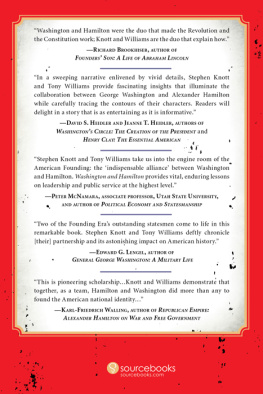
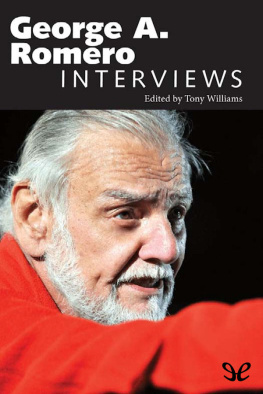
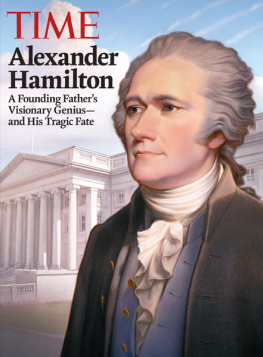
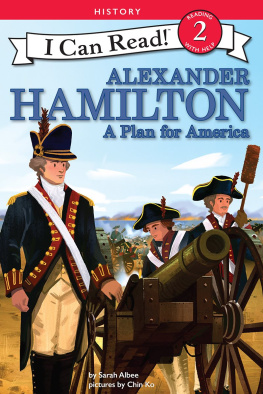
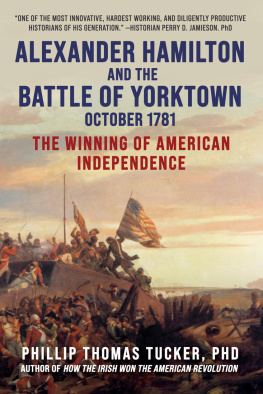
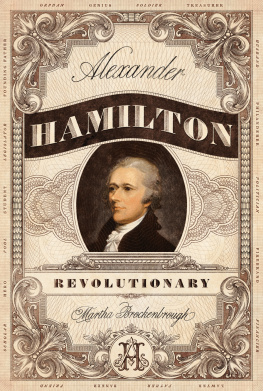
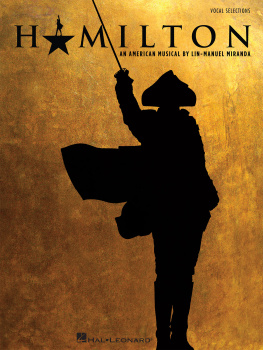
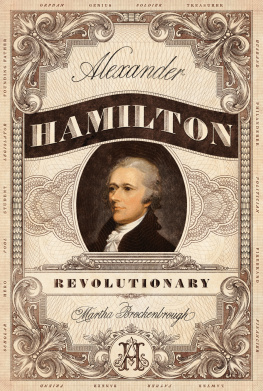
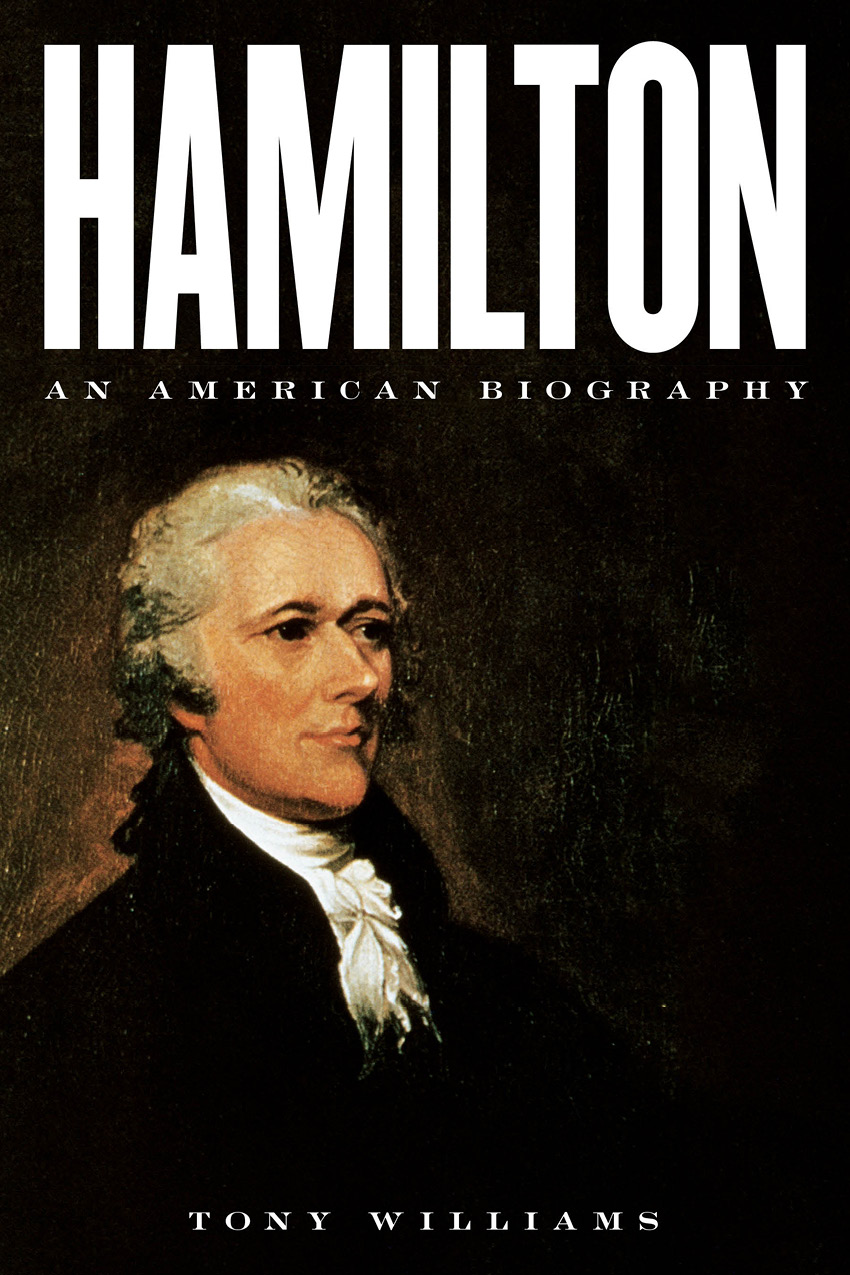
 The paper used in this publication meets the minimum requirements of American National Standard for Information SciencesPermanence of Paper for Printed Library Materials, ANSI/NISO Z39.48-1992.
The paper used in this publication meets the minimum requirements of American National Standard for Information SciencesPermanence of Paper for Printed Library Materials, ANSI/NISO Z39.48-1992.